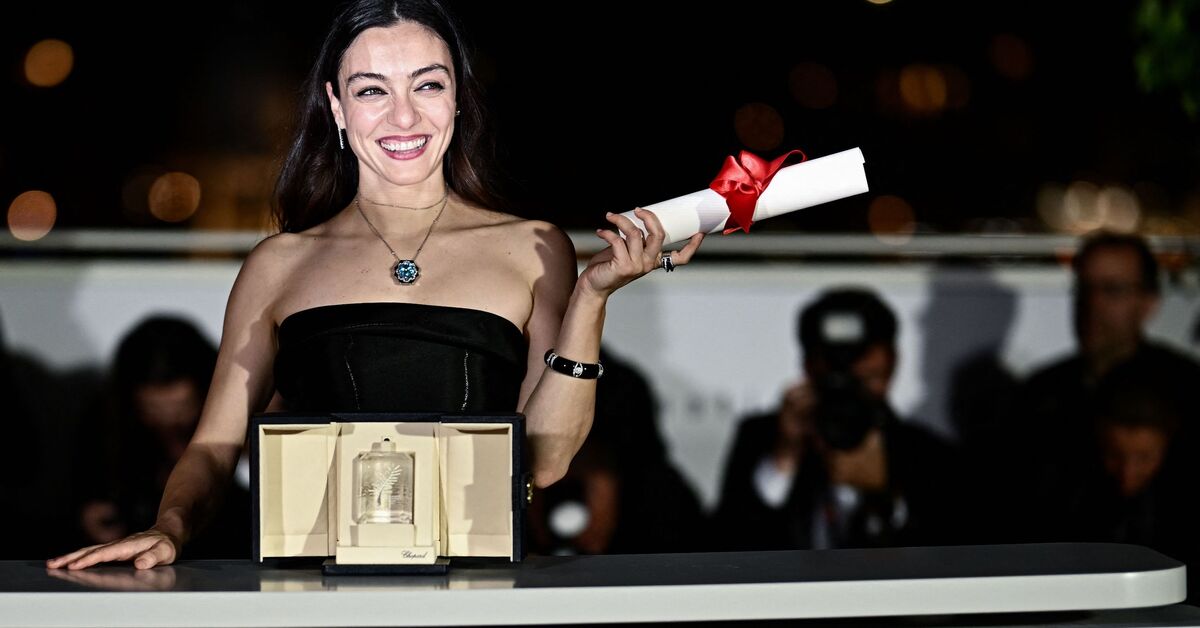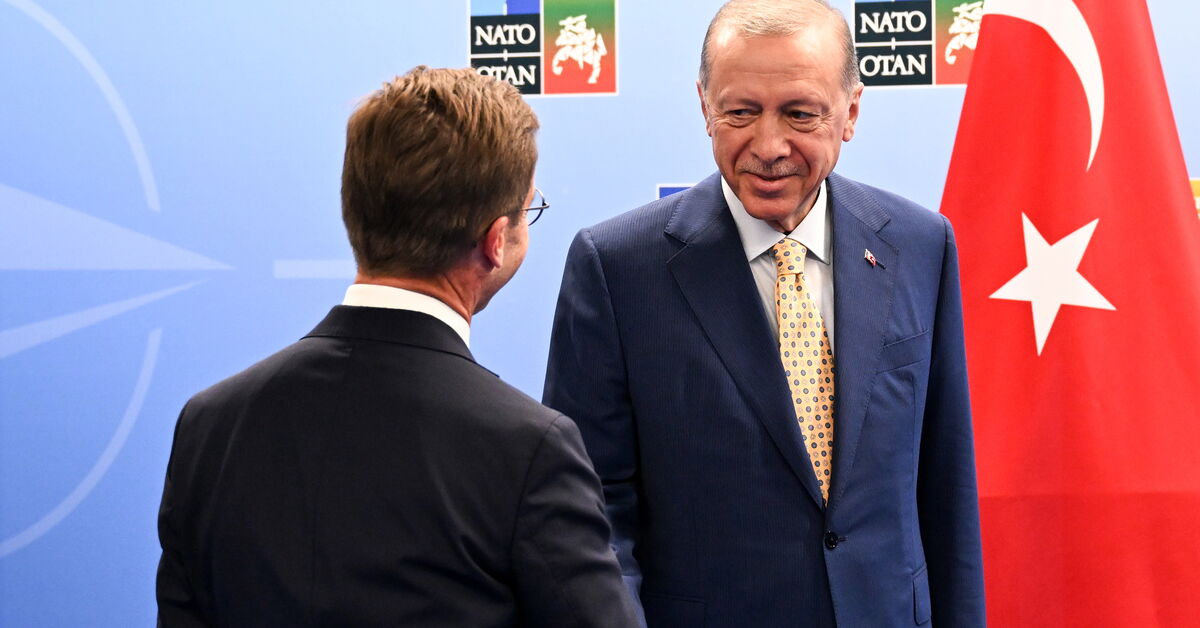Turkey’s conservatives lash out at actress Merve Dizdar after Cannes win
IZMIR, Turkey — Merve Dizdar, the first Turkish woman to win the best actress award at the Cannes Film Festival on Saturday, has caused the latest flare-up between Turkey’s conservative elite and the liberal culture sector, which fears further crackdowns in President Recep Tayyip Erdogan’s third decade in power.
Dizdar, an actress with a slight figure and a humorous, asymmetrical face, has become a dual symbol since her emotional acceptance speech at the international film festival on Saturday night, where she paid homage to Turkish women’s never-ending struggle for rights. Her speech immediately trended on Twitter, with her fans lauding her outspoken criticism of Turkey’s deteriorating record on women’s rights, particularly after two parties with arch-conservative views on women received seats in the new parliament elected two weeks ago. The two parties, Huda-Par and New Welfare, want to scrap laws protecting women against domestic violence, arguing that they break down “family unity,” and want LGBT clubs in the country closed down.
En İyi Kadın Oyuncu ödülü: Merve Dizdar #Cannes2023 pic.twitter.com/MwcnBXvnqu
— Filmmor (@Filmmor_) May 27, 2023
— Filmmor (@Filmmor_) May 27, 2023
Dizdar’s critics, which include senior figures in the government and the ruling Justice and Development Party (AKP), depicted her as a “pathetic slave of the West” who “dissed her country” for the sake of receiving an award — an accusation similar to those made to Orhan Pamuk when he received the Nobel Prize in Literature in 2006.
Dizdar plays Nuray, a sharp-witted teacher in award-winning director Nuri Bilge Ceylan’s lyrical drama “About Dry Grasses.” Nuray, who wears a prosthetic leg after a terror attack, maintains her hope in the community in sharp contrast to the film’s sardonic antihero Samet, who disdains most everything in the small Anatolian village where both are posted as teachers. The film was shot in several different villages in the eastern Anatolian province of Erzurum, a nationalist and conservative heartland where Ekrem Imamoglu, the mayor of Istanbul and a key figure in the opposition’s presidential campaign, was pelted with stones in early May.
Dizdar said that she did not have to prepare for the role of Nuray because being born in Turkey prepared her for this role. “I dedicate this award to all my sisters who never give up hope no matter what and to all the rebellious souls in Turkey who are waiting for the good days they deserve,” she said, trembling with excitement as she haltingly read from her notes.
Kemal Kilicdaroglu, the opposition candidate who lost the runoff to incumbent President Recep Tayyip Erdogan, congratulated her ahead of the runoff, promising that “better days” would come. Other members of Kilicdaroglu’s Republican People’s Party (CHP) and the opposition Table of Six followed suit.
Congratulations to Merve Dizdar, who won the best actress award at the Cannes Film Festival.
“I present it to all struggling souls who are waiting for the good days they deserve in Turkey.”
We are proud. 💫 pic.twitter.com/U6FnoqZydp
— Mansur Yavaş (International) (@mansuryavas_en) May 27, 2023
— Mansur Yavaş (International) (@mansuryavas_en) May 27, 2023
The Erdogan camp, however, was angered by her speech. Serdar Cam, the deputy minister of culture, accused her of “cursing her homeland” and compared her attitude with that of various “terrorist” groups that target Turkey. “Slices of that pie that you do not deserve will be distributed to new cadres,” he said in a thinly veiled reference to calls from conservative pundits who urged that shows on state-run TV stations that feature the actress should be pulled from the air and any state subsidy for her films be dropped.
It has also led to bickering within the AKP camp. Although Culture and Tourism Minister Mehmet Nuri Ersoy, arguably the most liberal personality in the outgoing cabinet, did not celebrate Dizdar, his wife, Pervin Ersoy, congratulated her, leading Metin Varank, a former AKP deputy, to ask, “Is she the wife of a CHP minister? It is unacceptable to support someone who has publicly humiliated our country.” The Ankara rumor mill indicates that Ersoy will not keep his seat in the new cabinet expected to be announced late this week, and be replaced by his deputy, Ozgul Ozkan Yavuz.
Divided and pessimist
The film sector, long divided along Turkey’s political fault lines, showed mixed reactions. “She has won a very prestigious award; show some respect,” tweeted Kadir Inanir, the Clark Gable of Turkish cinema, on Wednesday in response to criticism by Tamer Karadagli, an actor who seems to take his conservative macho roles to heart. “Do you express solidarity with the mothers of Diyarbakir whose children were kidnapped by Kurdish terrorist groups?” Karadagli asked Dizdar. Dizdar’s supporters mockingly tweeted that Karadagli could make that speech himself in the unlikely case he ever received an international award.
Turkish film critic Alin Tasciyan agreed. “Just like any actor who receives an award, Dizdar is entitled to speak her mind when called on stage. What she said — on women’s struggle in Turkey — is no news to anyone,” she said. “Her speech contains no insult to her country nor criticism of any particular person. If you want criticism, just listen to the next speaker, French director Justine Triolet, who walked off with the Palm d’Or in Cannes on French President Emmanuel Macron’s retirement plans.”
“We are used to online lynchings, the cancel culture that we live in,” Tasciyan told Al-Monitor. “But the polarization in the country is growing every day. But there are also physical attacks or financial pressures, which may grow.”
Earlier this year, Turkey’s Culture Ministry requested Turkish director Emin Alper to return the state subsidy he received for the political drama “Burning Days” despite the dozen awards the film received in local and international film festivals. The move was prompted by government-affiliated media outlets, which called the film LGBT propaganda, though its plot merely hinted at a homosexual relationship between the key characters.
Judiciary weaponized
The hardship faced by Turkey’s creative community goes beyond withdrawn subsidies or online attacks by trolls. Turkey’s judicial system is weaponized against singers and musicians through charges of “inciting hatred” — meaning they targeted religion or supported a minority group with, say, a joke on stage or a Kurdish song whose lyrics carry a hint of civil disobedience. Local groups belonging to AKP-allied New Welfare Party pressure governors to cancel concerts by female singers whose clothes they consider too revealing or who sing in Kurdish or Armenian. Even private cultural centers, fearing the government’s wrath, shy away from airing films that boldly criticize the government’s policies. Erdogan’s impassioned speech on his government’s view on culture in the “Turkish century” last week as he opened Istanbul Modern, a museum of contemporary arts at the heart of Istanbul, may herald a more aggressive policy on promoting what the new government considers its brand of culture and muting other versions.
Nil Kural, the director of the feminist film festival Flying Broom, expressed both concern and optimism. “It is not going to be easy for women and the LGBT from this point on,” Kural said before the opening on Wednesday. “Fortunately, we have the festivals [and] the civil society determined to fight our corner.”



